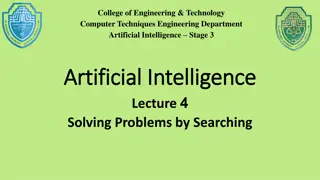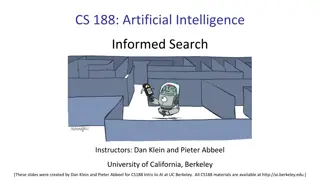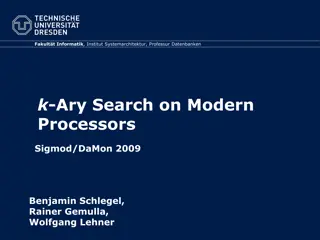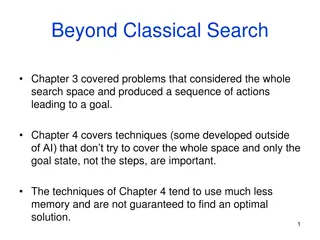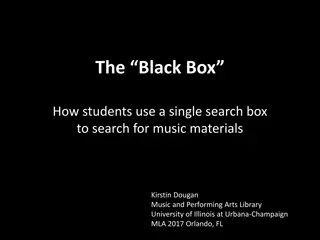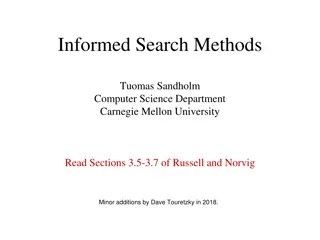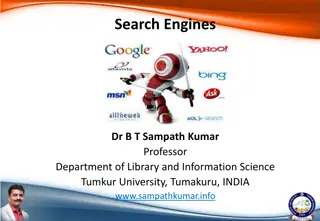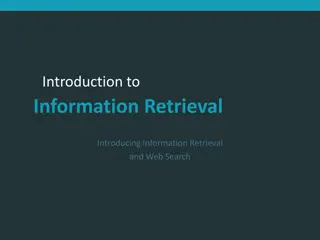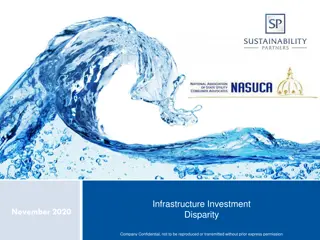Challenges and Solutions in Web Search Engine Infrastructure
Search engines play a crucial role in accessing internet resources efficiently. However, users face challenges in formulating queries, understanding search engine logic, and dealing with data quality issues. The infrastructure behind search engines involves complex processes like web crawling and indexing that present their own set of challenges. Solutions such as improving user education, refining search algorithms, and enhancing data quality control are essential for overcoming these hurdles.
Download Presentation

Please find below an Image/Link to download the presentation.
The content on the website is provided AS IS for your information and personal use only. It may not be sold, licensed, or shared on other websites without obtaining consent from the author. Download presentation by click this link. If you encounter any issues during the download, it is possible that the publisher has removed the file from their server.
E N D
Presentation Transcript
Web Search Engines COMP3220/6218 Web Infrastructure/Architecture Heather Packer hp3@ecs.soton.ac.uk 30/10/17
Search Engines Search Engines refer to huge databases of internet resources Users can search for information using keywords 5
Problems with searching Users do not understand how to provide a sequence of words for searches Users may get unexpected answers because they are not aware of the input requirement of the search engine. For example, some search engines are case sensitive. Users have problems understanding Boolean logic Around 85% of users only look at the first page of the result, so relevant answers might be skipped. 6
Problem with the data Distributed data with a high percentage of volatile data Large volume June 2000 Google full-text indexes of 560 million URLs Unstructured data gifs, pdf, etc Redundant data Mirrors (30% pages are near duplicates) Quality of data False, poorly written, invalid, misspelt Heterogeneous data media, formats, languages, alphabets 7
Simple Framework Query Engine Search index Interface Web Crawler 8
Web Crawlers Web Crawler, spider Start at a webpage Follow the hyperlinks that webpage points to Then follows the links those webpages point to Each page it visits it collects metadata about it Title - Images Content - URI Stores a file for each resource, with its meta data in a search index 9
Web Crawlers Issues with overloading web servers Mechanisms for sites not wishing to be crawled Robots.txt can request that only part of a web page to be crawled Coordinating search Parallel crawling Which pages to request Selection policy, Revisit policy Many modern web pages are dynamic pages / use JavaScript heavily 10
Query Engine Query s for search terms returning matches Matches are ranked using many features: How times does the page contain the keywords Do keywords appear in the title or url Does it contain synonyms for your keywords Is it from a quality source What is it s importance How often a page is updated Freshness of information Page load time 11
History of Search Engines
Before Search Engines Exploit hyperlink structure Personal homepages with links Directories Word of mouth Email, forums, Usenet 13
Timeline 90s Hand vs Crawler June 1993 1st Web Robot Wandex Meausres size Marh 1996 Larry Page BackRub SE 1998 Jan 1994 Altavista Google Search SE Sept1993 1st Web SE List April 1997 Ask Jeeves SE Jul/Sept 1998 MSN Search 1995 May 1996 HotBot SE April 1994 Yahoo! Web Directory LookSmart Web Directory Oct/Nov 1993 2nd Web SE List Jul7 1994 Lycos SE Dec 1993 3rd Web SE Crawler Indexer Seraching 1993 1994 1995 1996 1997 1998 14
Web services and Architectures Hand curated catalogues June 1993 1st Web Robot Wandex Meausres size Crawlers and indexes Jan 1994 Altavista Sept1993 1st Web SE List 1995 Centralised Search Engines April 1994 Yahoo! Web Directory LookSmart Web Directory Oct/Nov 1993 2nd Web SE List Jul7 1994 Lycos SE Distributed Search Engines Dec 1993 3rd Web SE Crawler Indexer Seraching 1993 1994 1995 1996 1997 1998 15
Yahoo! 16
Web Crawlers Wandex 1993 size of the web Web Crawler Dec 1993 - indexer WebCrawler 1994 - indexed entire web page 18
Search Engines Issues Scale How to rank pages to give the best results Spamming Web searches favoured web pages with high keyword density Keywords Spelling mistakes 20
Timeline 90s June 1993 1st Web Robot Wandex Meausres size Marh 1996 Larry Page BackRub SE 1998 Jan 1994 Altavista Google Search SE Sept1993 1st Web SE List April 1997 Ask Jeeves SE Jul/Sept 1998 MSN Search 1995 May 1996 HotBot SE April 1994 Yahoo! Web Directory LookSmart Web Directory Oct/Nov 1993 2nd Web SE List Jul7 1994 Lycos SE Dec 1993 3rd Web SE Crawler Indexer Seraching 1993 1994 1995 1996 1997 1998 21
BackRub Utilised PageRank More advanced than previous indexing Used back links 22
PageRank Assumes that more important websites are likely to receive more links from other websites Similar to a voting: where in links are votes the quality of a vote is determined by the number of votes (in links) Factors Considered: Number of in links Quality of in links Web page s context 23
Relevancy During 9/11 it was apparent that search engines did not cater of time-sensitive queries This lead to Google developing Google News The freshness of search engine s index became more important 26
Google 2012 In 1999, it took Google one month to crawl and build an index of about 50 million pages.* In 2012, the same task was accomplished in less than one minute.* 16% to 20% of queries that get asked every day have never been asked before.* *Mitchell, Jon. "How Google Search Really Works." Readwrite. February 29, 2012. 27
Search Verticals In a bid for content and market share, Search Engines develop other search verticals: Books Travel Finance Shopping Scholar 28
Mobile Search By 2015 mobile accounted for more than half of all search Searches need to be context aware (location) Limited screen and bandwidth means relevancy is critical Boost mobile-friendly pages in ranking algorithm 29
More than a Search Engine Calculator Images Infobox - structured information/queries Translation Mapping Voice commands Personal information eg search email, contacts, web 30
Search Engines Issues
Spamming Most search engines have rules against: Invisible text Meta tag abuse Heavy repetition domain spam Overtly submission of mirror sites in an attempt to dominate the listings for particular terms 32
Search Engine Optimisation Whole industry exists trying to boost search ranking Often gaming search ranking algorithms Arms race between SEO and search engines 33
Google and other SEs are a Business Search Engines record tracking information Google saves every voice search IP addresses Location Saves your searches Google s revenue is from adverts Improve their revenue with targeted advertising Google has a large research department Improve their technology 34
Search Engines - Tracking Oscobo no cookies no tracking no ip address no location Hulbee no ip address, no browser, no cookies MetaGer no ip address, search info, no location no cookies, encrypted https, no sessions Startpage send to google, and uses its ip address, no session Duckduckgo no ip, search info, no location, no cookies, encrypted 35
Summary What types of queries can be answered on the web What search engines are Their basic framework: Web crawler Search index Query engine Interface The history of Search Engines Issues with Search Engines 36


